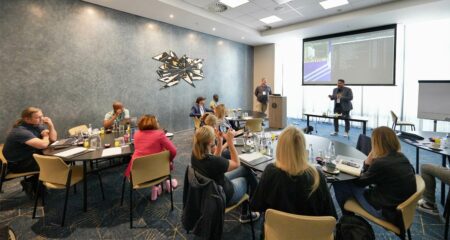Tech-savvy entrepreneurs in the informal sector could grow their businesses substantially if they had access to cheaper data and better bandwidth.
More than that, they could also help to improve public service delivery if government departments migrated from the suburbs to the townships and recruited locally.
The idea of making IT jobs in the public sector more readily available to smart township youngsters was raised at a discussion hosted by SUSE and TechCentral looking at IT in the public sector (watch the video of the webinar above). “The skills are there, they just need to be given the opportunity,” said Aslam Raffee, the public sector lead for SUSE.
If an open-source policy adopted by cabinet in 2007 was driven harder, it could accelerate the growth of IT skills as well as build the economy. Open source provides “an opportunity for innovation without permission”, Raffee said, as there are no barriers for anyone wanting to get involved. “Open source offers a unique opportunity for access to the best skills because you can join an open-source project and start learning. It offers a lot of opportunities for people to get involved in IT projects from entry level all the way up to being involved in some of the best software projects in the world.”
Nhlanhla Mabaso, executive manager for cybersecurity at Armscor, proposed that state entities should be based in the townships and rural areas to tap into the skills there. “My argument is that many of the people with skills are sitting out there, but they have been left out of the system by a lack of physical access or not hearing about the opportunities. Imagine if some of the offices weren’t in Fourways but in Msinga. Imagine what could come out of that,” he said.
Inclusive digital society
Government could overhaul its IT systems more rapidly if smart informal-sector entrepreneurs were encouraged to bring their talents and solutions into play, Mabaso said.
That would require a more inclusive digital society where everyone has access to fibre and affordable broadband, but it’s still far from affordable for many.
Panel moderator Daniel Robus said it is in everybody interests to have a secure, efficient public sector, which means it has to become a place that skilled people want to join to build solutions and build the country.
 Yet staff turnover and the resulting loss of institutional memory in government IT jobs is a major hurdle, compounded by finding enough budget to recruit top-level skills to replace them, Mabaso said.
Yet staff turnover and the resulting loss of institutional memory in government IT jobs is a major hurdle, compounded by finding enough budget to recruit top-level skills to replace them, Mabaso said.
Another problem is the mess of disparate systems, which are often old or obsolete, and run in silos that don’t interoperate. The government was once a great place for geeks to work because every piece of IT ever invented was running there, Raffee joked. “There isn’t a piece of technology that you won’t come across, so you get wide skills. But that’s also part of the challenge — because you have such a wide array of technologies in your environment, you need a very wide skills base to look after them all, and all these systems don’t speak to each other.”
Public sector CIOs must simplify, modernise and accelerate innovation to make the government more efficient, Raffee urged, but modernising legacy systems demands decades-old skills and a serious budget.
Robus suggested that IT salesmen have exacerbated the problem by selling whatever piece of kit is on their inventory. Mabaso agreed. “Some of you have been unscrupulous, as we hear from the Zondo Commission, and some of you have done the right thing,” he said. Sometimes the problem has come from the supposedly safe decision of only buying big names and best-of-breed equipment, which has backfired by locking departments into a particular vendor and creating silos.
“The public sector has invested a lot of money in technology, but we haven’t seen better service delivery — just a hodgepodge of disparate systems and not the improved service delivery expected from things like e-gov solutions,” Raffee added. What it needs to do now is design digitally native solutions, not just migrate old systems into the cloud. “They get no value in doing that. It’s about changing the way IT operates, using technologies like DevOps to be continually developing solutions.”
WhatsApp and Facebook
The debate also featured activist and marketing strategist GG Alcock, the author of Kasinomic Revolution – The Rise of African Informal Economies. Alcock shed light on the vibrant state of South Africa’s informal sector, and said it should be taken far more seriously by government officials who don’t fully grasp its importance.
He cited examples of vetkoek sellers earning R3 500/day with a 50% profit margin, and the 50 000 fast-food outlets that turn over R90-billion a year and employ 200 000 people.
There were massive untapped opportunities for IT to help grow these businesses by aggregating their orders, for example, or helping people find a room to rent through something like Airbnb for the masses.
The dominant technologies in the informal sector are WhatsApp and Facebook, accessed by using free Wi-Fi in shopping malls to update the apps and conduct business. The cost of data and airtime hampers the ability of IT to grow these businesses, which will benefit enormously if someone devised new data-lite solutions like payment and ordering systems, or geolocation databases to formally identify them and help them access loans or grants.
“We have the entrepreneurs out there – we need to recognise and support them,” Alcock said.
- This promoted content was paid for by the party concerned




